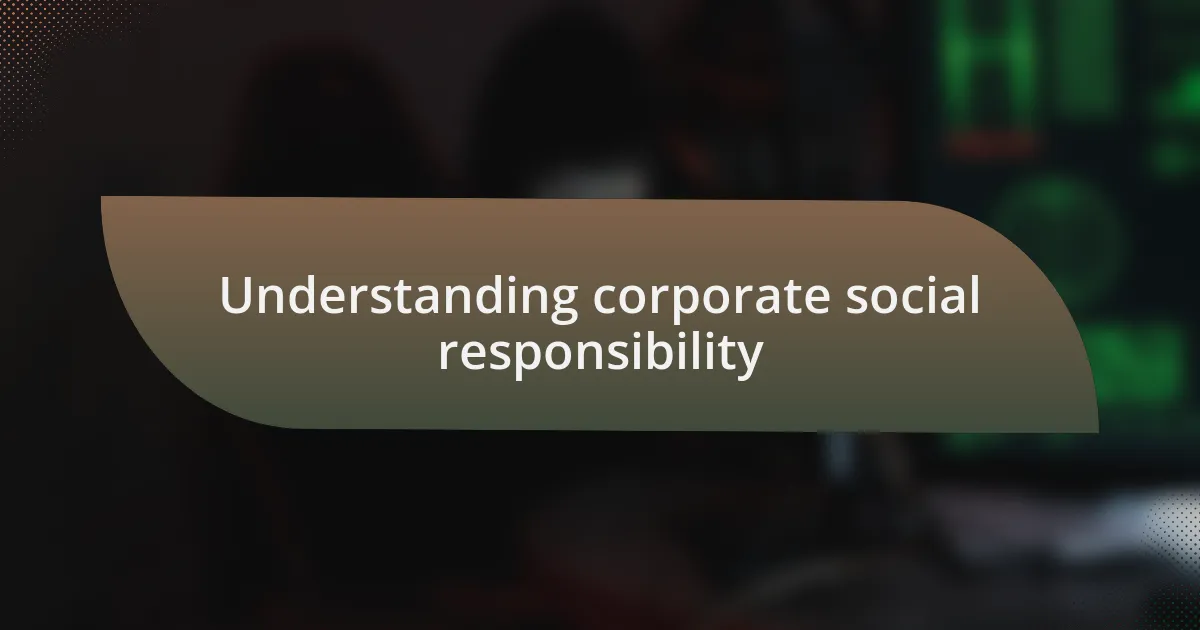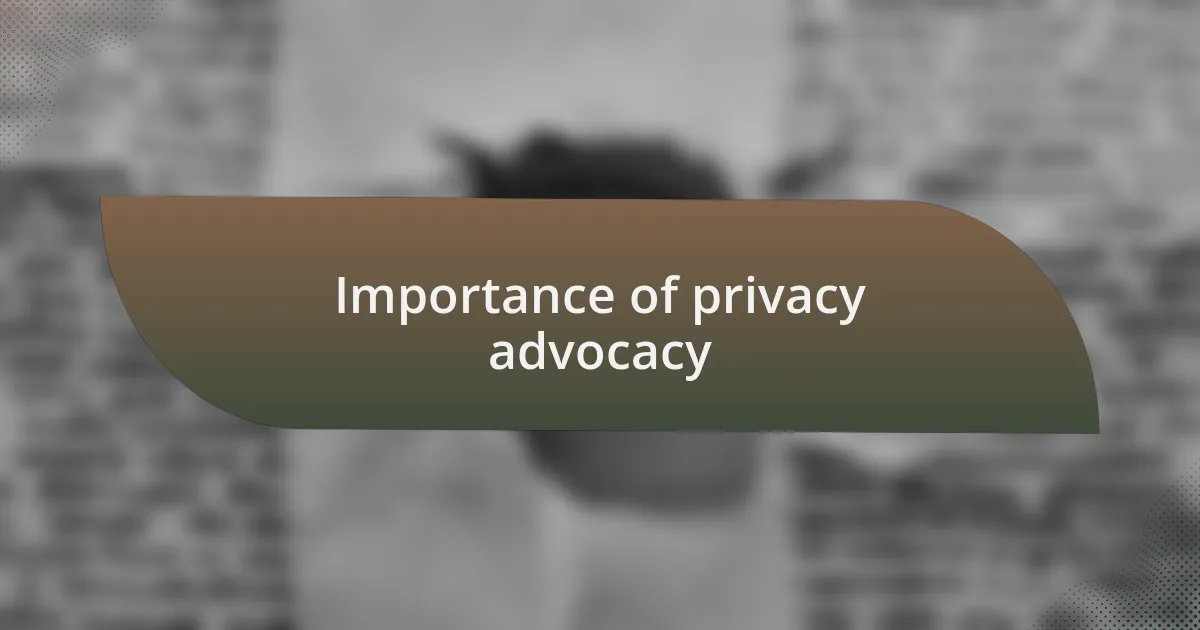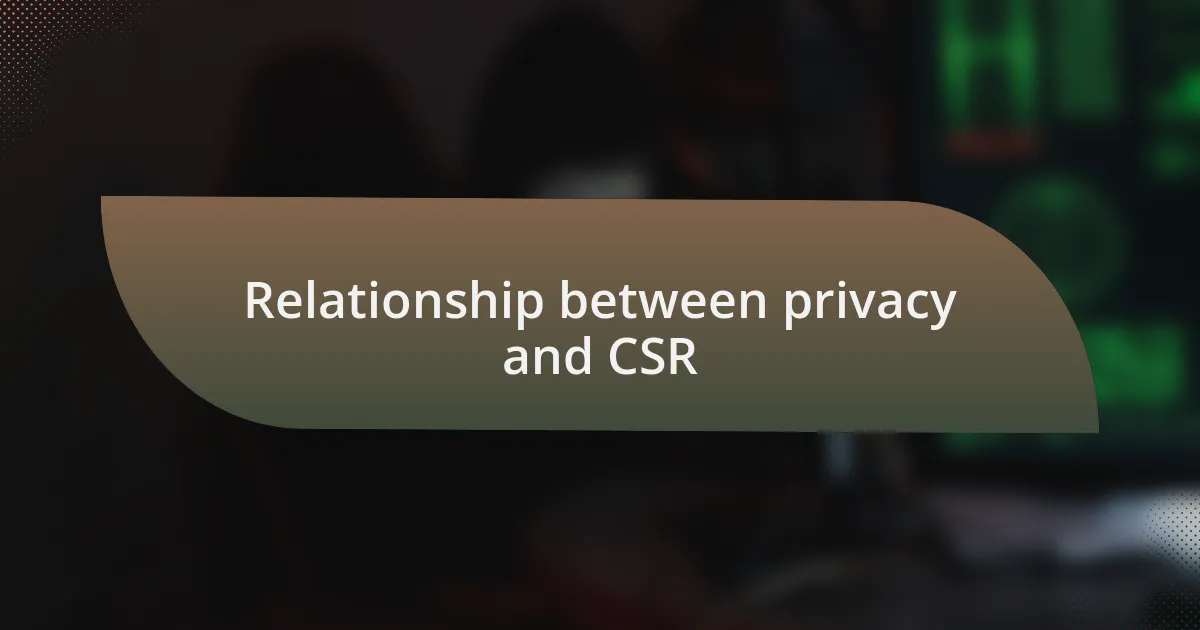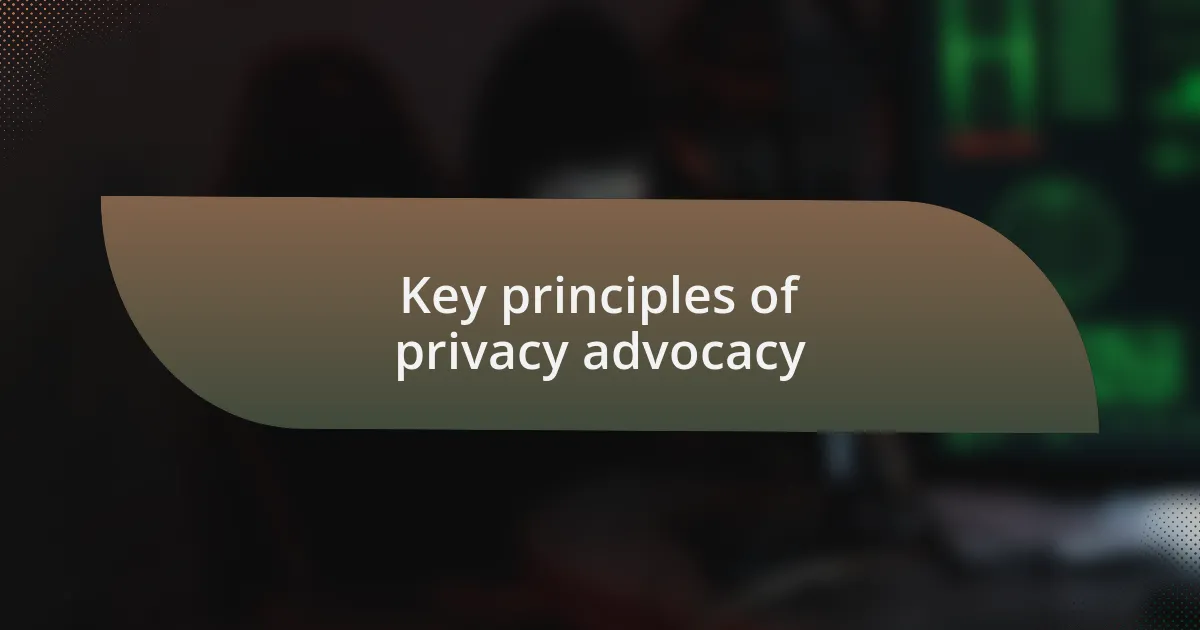Key takeaways:
- Corporate social responsibility (CSR) enhances company reputation and customer loyalty through genuine social and environmental commitment.
- Privacy advocacy is crucial for holding companies accountable in protecting personal data and building customer trust.
- Integrating privacy practices into CSR strategies is both ethical and beneficial for business, leading to stronger consumer relationships.
- Key principles of effective privacy advocacy include transparency, accountability, and education, which empower consumers and foster trust.

Understanding corporate social responsibility
Corporate social responsibility, often referred to as CSR, is the commitment that companies make to take responsibility for their impact on society and the environment. I remember my first encounter with a company that went above and beyond in their CSR efforts; it wasn’t just about profits for them—it was about giving back and creating a positive community change.
Consider this: when a company invests in sustainable practices, how does that affect their reputation? From my observations, businesses that genuinely embrace CSR often see increased loyalty from customers who value ethical considerations. I’ve seen firsthand how a small local business that prioritizes fair trade not only enhanced its customer base but also fostered a sense of community pride.
Despite the growing interest in CSR, there can still be skepticism about its authenticity. I often find myself questioning—are companies genuinely invested in social change, or are they simply ticking boxes? In my experience, the difference can often be seen in the depth of engagement; those who truly care create lasting partnerships with local nonprofits, while others may merely make occasional donations without real commitment.

Importance of privacy advocacy
Privacy advocacy is essential in today’s digital age, where personal information is often treated as a commodity. I still remember the sense of vulnerability I felt when I received an email notifying me of a data breach affecting a service I used. This experience underscored the critical need for advocates who can hold companies accountable for how they manage and protect our data.
The importance of transparency in data practices cannot be overstated. When I speak to individuals about privacy rights, many are shocked to learn the extent of data collection by seemingly harmless apps. This revelation makes me realize that privacy advocacy not only educates the public but also empowers them to demand better practices from corporations, thereby fostering stronger data protection.
Moreover, privacy advocacy cultivates a culture of trust between companies and their customers. I’ve seen organizations that prioritize privacy initiatives earn deep loyalty from their user base. Isn’t it interesting how a commitment to safeguarding personal information can lead to heightened customer satisfaction and sustained relationships? Ultimately, through effective advocacy, we can create a society where privacy is respected and valued.

Relationship between privacy and CSR
The connection between corporate social responsibility (CSR) and privacy is more significant than many realize. When I reflect on CSR initiatives, I think about how they often include commitments to ethical data handling. For instance, when a company openly shares their data privacy policies and genuinely strives to protect consumer information, it demonstrates a deeper respect for their audience. Isn’t it powerful when a brand not only pursues profit but also prioritizes the welfare of its customers?
One memorable encounter I had was with a tech startup that made headlines for their clear stance on data privacy as part of their CSR strategy. They not only educated users on how their data would be used but also engaged them in conversations about privacy rights. This approach not only set them apart from competitors but created an authentic bond with their users. It made me wonder: could companies that prioritize privacy as part of their CSR efforts be paving the way for a new standard of consumer trust?
Moreover, integrating privacy into CSR isn’t merely ethical; it’s a savvy business strategy. I have observed that companies that actively protect user data often see an increase in customer loyalty and brand reputation. This correlation makes me optimistic that as more businesses recognize the value of privacy, we could shift towards a marketplace where responsible practices are the norm rather than the exception.

Key principles of privacy advocacy
Every advocate for privacy must grasp the fundamental principle that transparency is key. In my experience, when organizations choose to be open about data collection practices, it fosters trust with their audience. I remember working with a nonprofit that prided itself on revealing how donations were allocated, and it struck me how this simple act of openness led to increased community support and engagement. Doesn’t it make you wonder how much more businesses could gain if they adopted a similar approach?
Another central principle is accountability; companies must take responsibility for their data practices. From what I’ve seen, when organizations face scrutiny regarding their data usage, those that own up to mistakes often emerge stronger. I recall a case where a large corporation released an apology following a data breach. Instead of hiding, they publicly addressed the issues, implemented changes, and rebuilt trust. Isn’t that the kind of courage that really resonates with consumers?
Finally, education plays a significant role in privacy advocacy. I’ve observed that when companies invest in educating their customers about privacy issues, it not only empowers users but also creates a more informed audience. I often think back to a workshop I attended where experts explained the importance of data privacy. The experience reinforced my belief that informed consumers are the strongest advocates for privacy. How can we expect users to protect their data if they don’t understand the implications?

Strategies for effective privacy practices
When I think about effective privacy practices, one strategy that stands out is the implementation of robust data encryption. In my previous role at a tech startup, we adopted end-to-end encryption when handling sensitive information. The change not only safeguarded our users’ data but also signaled to them that we were serious about their privacy. Have you ever noticed how a little extra security can go a long way in building confidence?
Another crucial strategy is regular privacy audits. I remember participating in one where we scrutinized our data practices extensively. The result was eye-opening; we identified several outdated protocols that compromised privacy without us realizing it. This proactive approach not only improved our compliance but also demonstrated to our clients that we valued their trust. Imagine what your organization could discover by simply reassessing how you handle data.
Lastly, fostering a culture of privacy within the organization can be transformative. I once worked with a company that integrated privacy into their onboarding process. Every new employee was trained on privacy issues and data handling from day one. It was heartening to see how this commitment spread throughout the company, creating a maximally secure environment for both employees and customers. What would happen if every organization took this commitment seriously?